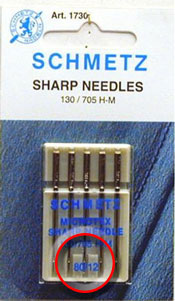- Home
- Quilting Tools/Supplies
- Sewing Machine Needle Sizes
What Do
Sewing Machine Needle Sizes Mean
This post contains affiliate links, for which I receive compensation.
When a quilter talks about sewing machine needle sizes, they'll say, "It's an 80".
Or "It's a 12".
Or "It's an 80/12".
Just what exactly do those numbers mean?
The Sizing Systems
The sizes are found on the front of the packaging (circled in red to the right).

That first number is the Number Metric (shown as NM). This system was set up in the 1940's to standardize needle sizes.
It is simply the diameter of the needle shaft in millimeters multiplied by 100 to get rid of the pesky decimal places. That means that our standard "80" needle is really .80mm in diameter. (You're glad you asked, right?)
What it means to you as a quilter is:
The larger the needle size, the stronger and thicker the shaft.
So where does the '12' of the 80/12 name come from?
It is nothing more than the merging of two measuring systems. The '12' comes from the corresponding Singer or US needle system. The '80', as we've learned, is the diameter of the shaft in millimeters multiplied by 100.
A Sad but True Story
I stood admiring the quilt from afar in a local quilt store.
The thread was so sparkly, so bright, so blue. I was mesmerized.
And to be honest, I wanted some of that luscious thread for my stash.
I drew closer...and closer...
Imagine my dismay, when I realized that the "sparkly thread" was really sunlight shining through the window behind the quilt and through the gaping holes left behind by a needle that was too big.
The lesson learned...?
Test your thread and needle choices first before quilting your quilt!
Make Your Choice
The two most important things to remember about sewing machine needle sizes are:
Choose the needle size just large enough to get the job done.
A needle that's too big leaves unsightly holes—just like that sparkly(not!) quilt I saw.
Choose the needle eye based on the type and weight of thread you use.
The thread should pass through the needle eye with a minimum amount of friction.
Now we'll move onto the Sewing Machine Needle Guide for Quilters which describes the types of needles available for quilting.



